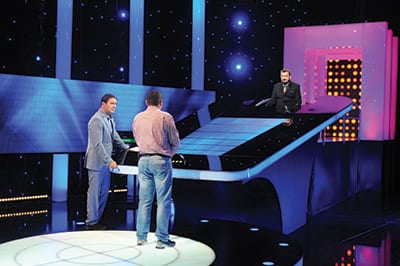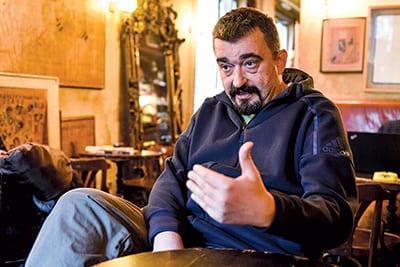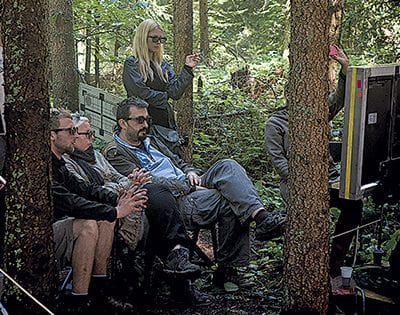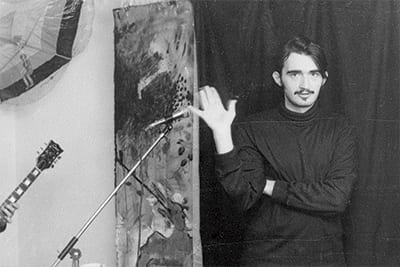Milorad Milinković is shooting a television series called Kljun [Beak], which he says will be Panonian film-noir, based on a clash of mentalities
Milorad Milinković ‘Debeli’ (1965) graduated in Film and Television Direction at the Novi Sad Academy of Arts, in the class of professor Vlatko Gilić. He is best known for his cult black comedy Mrtav ‘laden [Dead Cold], while he’s also directed the films Potera za Sreć(k)om [Chasing Luck(y)], Čitulja za Eskobara [Obituary For Escobar], Zduhač, znači avantura [Zduhač Means Adventure], Serbia’s first 3D film – Peti Leptir [Fifth Butterfly] and Patuljci sa naslovnih strana [Dwarfs From The Front Pages].
He’s also directed theatre plays, particularly during the 1990s. Remaining in popular memory from that period is his play Ziggy Stardust, a homage to David Bowie, which was performed to great success at Belgrade’s Bitef Theatre. Two years ago he also adapted the text of the play Captain John Pipplefox for the Duško Radović Little Theatre.
Also engaged actively in music, in the mid-1980s he founded the band Morbids and Mnights, performing in Belgrade’s underground nightclubs as the band’s guitarist and singer. He was also in the band Dragons, releasing an album with them in 2003.
According to his Wikipedia profile, Milinković is also a writer, disc jockey, football commentator, while he’s best known to the general public as The Chaser in the popular quiz show The Chase.

Our interlocutor is clearly versatile and educated in the renaissance spirit. But what can’t be seen from biographical data is his laid-back style and the calmness with which this director communicates. Milinković comes across as completely unpretentious, even modest while referring to the books, films and authors that have shaped his view of art and life. Although he shoots (black) comedies, he is not the kind of interlocutor who will recount ten witty anecdotes during the conversation in order to illustrate what he wants to say. One doesn’t get the impression that he wants to impress at any cost. His films say enough by themselves.
You’re obviously interested in many things. Why did you opt for film/theatre directing?
In secondary school, I was only interested in music, but I knew I wouldn’t be able to do it for a living. I had an affinity for the natural sciences and had excellent grades in astrophysics and, when I was supposed to serve in the army, I signed up to study astronomy.
There was no entrance exam and I found it fun to learn about the stars and planets. It was at the age of 21 that I decided to study what I would like to do for a living. Apart from music, directing was the most interesting to me. I spent my secondary school years at the Cinematheque Film Archives. There I learned that the film is bigger than life. Deep down I’m not a swot, but before the entrance exam, I read all books of film theory. It was a special honour for me to be accepted into the class of Vlatko Gilić in Novi Sad because I loved his films. I’m curious, and direction is one of those jobs that enable you to do a lot of things that interest you simultaneously…
I’ve done everything that interests me in my life whenever I got an opportunity. Everything that happened to me happened by chance. The only thing I planned was to direct
You were part of the urban team of the ‘80s. Can you compare the spirit of Belgrade then and now?

Everything’s always nice when you remember your youth. In the circles that I moved in, it was normal for me to hang out with painters, musicians, people from the art scene etc. Music was played at the openings of exhibitions, concerts performed for various reasons… we were circulating and socialising constantly. I had the impression that that was the most creative period because I was surrounded by all those people.
I don’t like to mythologise any period. The spirit is always the same and everything is wonderful when you’re young. My parents also spoke about how their time was the best, and they didn’t live easily. I believe that young people today are also having good times.
You graduated with a documentary film about eccentric punk musician Satan Panonski, while you’re recognisable for your black comedies. How did you construct your directorial style?
At the Academy, we were encouraged to deal with the completely alternative. Now the alternative has become a “must”. In other words, in order to receive money from the state, it’s desirable for a film not to be watchable. The closest genres to me are a thriller, black comedy and fantasy. I loved Hitchcock because of his film language and serious concept. I love all classic films, those of Truffaut, and particularly Chabrol, Melville et al. The closest poetics to me are those of Spanish director Alex de la Iglesia.
My films resemble each other a lot because I see myself in all of them. I believe there are two types of artists. The first are those who constantly create the same work. Those include the likes of Beckett, Bergman, Tarkovsky, or the Rolling Stones in music. You know exactly what to expect – excellent variations on a single theme. The second kind creates something different every time. Those include Ionesco or The Beatles. Perhaps the best example is David Bowie, who thought in a similar way throughout all stages of his career but made albums that were completely different stylistically. I’d like to belong to this second group, with every subsequent film appearing to be different from the previous one, whilst still retaining my stamp and seal.
I’m inspired the most by the conversations I hear. That’s why I say in jest “If you do not see it in a film, don’t tell me about it in a tavern”
You’re currently preparing something you haven’t previously done…
I am very happy to be shooting the television series Kljun [Beak]. It will include 12 one-hour episodes and should premiere next autumn.

It will be a crime drama set in Subotica and the surrounding area. A real Pannonian noir! I always wanted to make a series that isn’t set in Belgrade, and Subotica is ideal because it’s a multicultural community, close to the border, with beautiful landscapes… I want to make a European series, which isn’t typical for us. I’m primarily interested in clashes of mentalities. I studied murder statistics in that area, but it won’t be typical film noir: it will have elements of fantasy and all sorts. This series is the first time that I can create something in a genre that’s not related to comedy.
Which genre best suits the times in which we’re living?
I’m convinced that’s tech-noir.
Where do you find inspiration?
I’m inspired the most by the stories I hear. I sometimes see some news item on TV and consider how that could be made into a good story. Sometimes I simply dream of something that later galvanizes me. However, I primarily find it in conversations. That’s
why I say in jest “If you do not see it in a film, don’t tell me about it in a tavern”.
Your films have specific humour. What makes you laugh?
Lots of things… a good joke, a good film, music, and sometimes also public figures can be funny. In principle, I’m a cheerful man, which is why I like to work on dark topics
How did you become a Chaser in the quiz show The Chase?
I enjoy watching quiz shows generally. The English version of this quiz was my favourite. My involvement came by chance. The production company that produced The Chase called me. I came to the television station and it turned out to be an audition. There were lots of people. They asked me a hundred questions and told me I’d passed. I read a lot and remember bizarre things, and that’s great for a quiz. All quiz questions are a kind of mental gymnastics for me. I know everything from music, while I’m good at history and literature… but I daren’t tell you which are my weak areas.
Could you share with our readers some interesting facts about this quiz show?
Various competitors have, to put it mildly, strange ideas about how we’re cheating them. There are various theories. One of my favourites is that we have invisible ‘bugs’ in our ears. Believe it or not, some contestants think that we press the buttons without reason and that the editing process is directed so that it looks like we know everything!
Thanks to that quiz, you’ve become a media star…
I’m essentially a shy person; I used to get the jitters when I was dealing with music earlier. I don’t like exposing myself, which is why I’m behind the camera. I had a habit of appearing in some shot in a film, but no more than that. Now I’ve already got used to public appearances and don’t even get jittery during the quiz show. I get recognised on the street, on the market; I chat and have my picture taken with people when they ask. That’s all okay.
I want to make a European series, which isn’t typical for us. I’m primarily interested in clashes of mentalities
Those who like sports know you as a football commentator on Eurosport. Whose idea was it for you to try your hand in that role?
I’ve done everything that interests me in my life whenever I got an opportunity. Everything that happened to me happened by chance. The only thing I planned was to direct.

So, I never even considered that I would become a football commentator. I was called by my friends, friends because they know I love football. And, here we are, for eleven years already I’ve been commentating in tandem with my colleague on Germany’s Bundesliga. Then, at some point, they told us at Eurosport that we also have to comment on some winter sport. As we aren’t professional commentators, we chose curling, which isn’t a very popular sport. We initially didn’t know anything about it. Now, after ten years, we can be considered experts.
When you comment on sportscasts, do you get annoyed, cheer or maintain cold neutrality?
Whenever I watching football or any sport, I always cheer a little. I’m not generally an irritable person by nature, so I’m not prone to ecstasy or sorrow. As I co-commentate with my colleague, we always decide who will cheer for whom prior to the start of the broadcast, to make things more interesting for both us and the viewers.
I’ve certainly made a million lapses, but I can’t remember any specific one. I remember the pearls of sports commentators. One of my favourites is the comment of Vladan Stojakovic: “Outstanding intervention by goalkeeper Ljukovac. And now let’s see why the Germans are celebrating!”.
I read a lot and remember bizarre things, and that’s great for a quiz. All quiz questions are a kind of mental gymnastics for me. I know everything from music, while I’m good at history and literature… but I daren’t tell you which are my weak areas
Do you have time for a hobby?
I work a lot, so I mostly don’t have time for many things. I have my daughter Divna, who’s five, and I try to be with her as much as possible. We play, I take her to ballet practice…
I gladly watch films or TV series. The series Black Mirror is excellent, I watch two or three episodes at a time. Next on the list is the series Babylon Berlin. I’m currently reading Cortázar and a historical book about the Sarajevo assassination. I listen to music, mostly rock ‘n’ roll, but I also like jazz, classical music etc. High-quality music is a fusion of genres, and I like fusion.
I like to cook, but I don’t do it often because I don’t have time. But when I do, I always rely on inspiration.
You haven’t given up on music entirely?
I play from time to time. I created a theme song for “Dwarfs”, which will be aired as a mini-series next year. I played the song on guitar, then the arranger sorted it out. I’ve also written two songs for my daughter to sing.
What would a film about your life look like?
It would be very boring! I want my life to be tranquil and my films interesting.
I don’t believe people who say that when they look back they wouldn’t do anything different. I think a person should constantly improve themselves, to advance. To paraphrase Flaubert, we’re not important, but our works are.